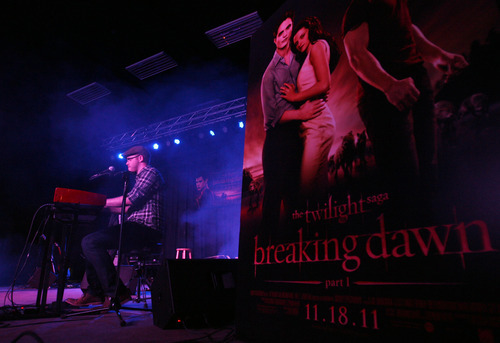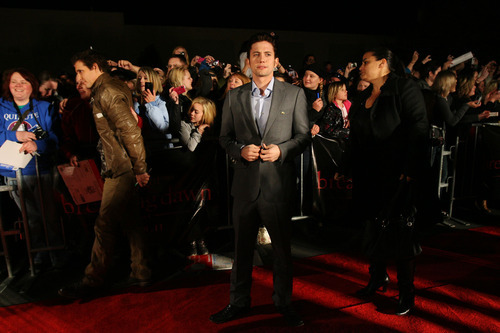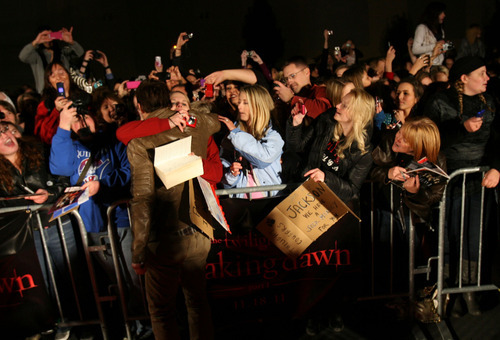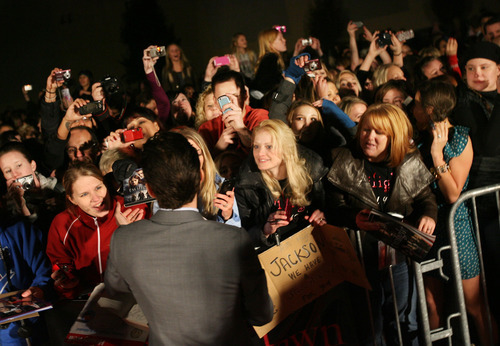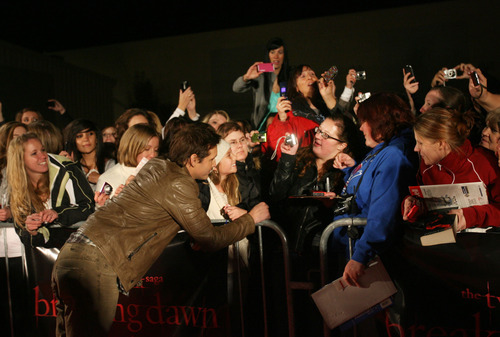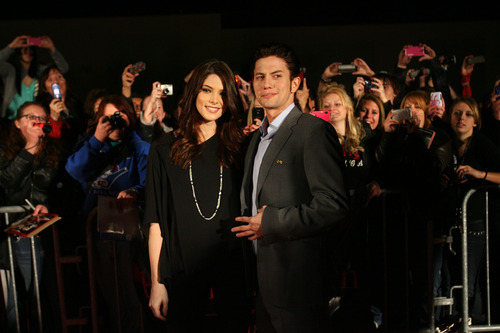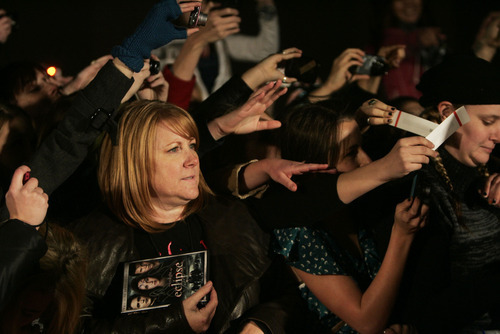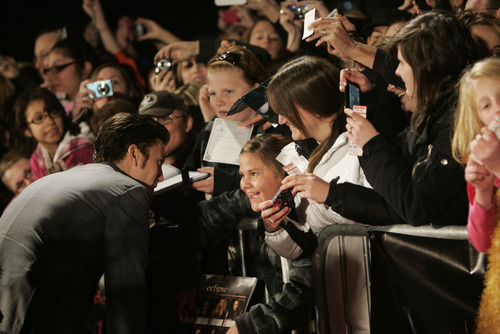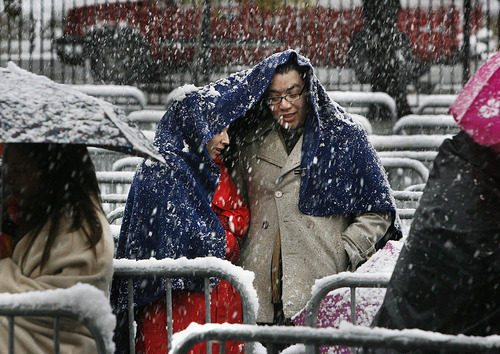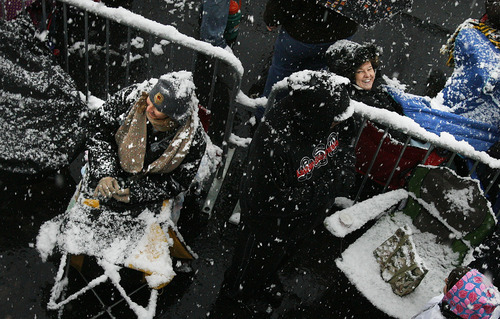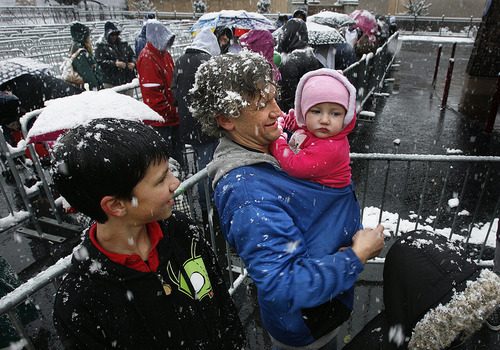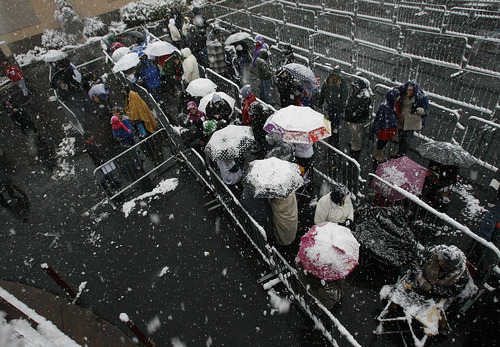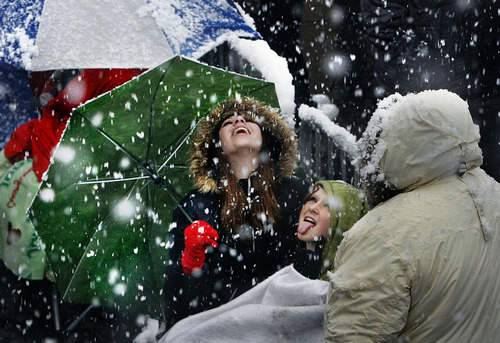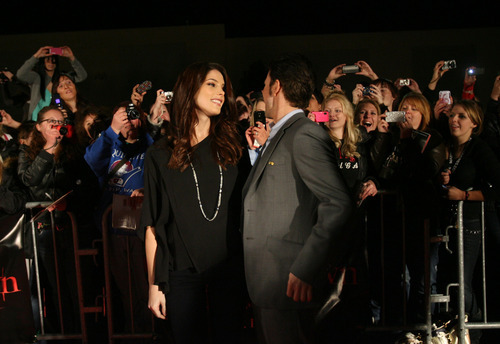This is an archived article that was published on sltrib.com in 2011, and information in the article may be outdated. It is provided only for personal research purposes and may not be reprinted.
Heather Cook knows her vampires. She may not know anyone else's vampires, but she knows hers — the sparkly romantic bloodsuckers of Stephenie Meyer's best-selling "Twilight" series.
"I just love the whole fantasy world," said Cook, 27, outside a "Twilight" publicity event last weekend in Salt Lake City. "It's sensual and dangerous at the same time."
Ask Cook — who sported a black fedora and red-rimmed contact lenses for the full vampire look — about how Meyer's Cullen clan varies from other vampire lore by sparkling in sunlight instead of bursting into flames, and she gets defensive.
"TV's a totally different dimension — 'Vampire Diaries' can burn all they want," replied Cook, a mother of three from North Ogden, ignoring centuries of vampire stories that predate The CW.
The "Twilight" franchise has spawned four novels, five movies (the last book was split into two films, the first of which, "Breaking Dawn, Part 1," hits theaters nationwide Friday), a cottage industry of merchandise, and the undying love of millions of fans.
Monique Tafoya, of Herriman, brought her 8-year-old daughter and 13-year-old step-daughter with her to the "Twilight" publicity event, which drew hundreds of screaming fans to see several film cast members.
"I'm totally a fan," Tafoya said. "I got everyone being a fan, the whole family."
Another Herriman mom, Nicole Corbett, said she likes "Twilight," because "it's just fun — it's not too edgy for little girls, but it's fun for adults, too."
The fan base for "Twilight" is mostly women — often split between teen girls (the original intended audience for Meyer's young-adult books) and their moms.
The "Twilight" moms are bigger fans than the teens, said Christine Seifert, associate professor of communications at Salt Lake City's Westminster College, who has written academic papers about "Twilight."
"It goes back to that idea, the fantasy of having these incredibly extraordinary guys fighting over you," Seifert said of the series' central triangle between human Bella Swan, vampire Edward Cullen and werewolf Jacob Black. "Isn't that the trope of any romance novel?"
The actors from "Twilight" have seen the moms get a little, well, intense.
"I've seen kids used as fodder for moms," said Charlie Bewley, the British actor who plays Demitri, member of the ruling Volturi clan, in the "Twilight" films.
Added actor Jackson Rathbone, who portrays Edward Cullen's adoptive brother Jasper Hale: "I've seen a few mom mow their kids down to get to us. But it's also brought mothers and daughters together, [and] it's brought people to reading."
The fan adoration has been a surprise, said Peter Facinelli, who plays Dr. Carlisle Cullen, the family's patriarch. "When we signed on, I don't think any of us thought it would be this huge thing," Facinelli said.
Nikki Reed, who plays Cullen member Rosalie Hale, also found the series' popularity surprising.
"Most of the time you're making a movie, in this economy you're lucky if five people see your movie," Reed said. "After the success of the first [movie], I was constantly aware of my desire to please the fans," Reed said.
The success of the first "Twilight" made Ashley Greene, who plays Edward Cullen's clairvoyant sister Alice, "much more comfortable, knowing the fans embraced it."
What, exactly, are "Twilight" fans embracing?
"It's an intriguing tale of immortal love — everybody wants that," Rathbone said.
One factor that makes the Twilight saga so compelling is the appeal of a love story about a girl-next-door character. "There's something about the narrative of the everygirl, the average girl who's just like us in every way, who sweeps this 108-year-old vampire off his feet," Seifert said. "I think that's a fantasy for a lot of people."
And "Twilight" fans — much like Trekkies or any other group devoted to a particular franchise — don't take kindly to others analyzing or criticizing their favorite fictional universe.
"Analyzing the books or movies as a cultural artifact rather than a cultural experience is really unsettling," Seifert said. "There's something about the narrative, and we don't sully that with analysis."
movies@sltrib.com
Twitter: @moviecricket
www.facebook.com/themoviecricket; www.facebook.com/NowSaltLake


